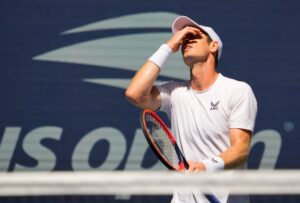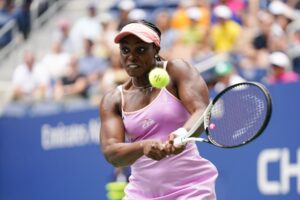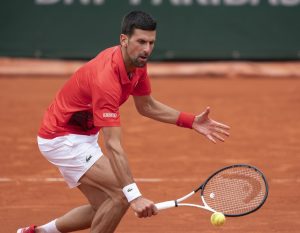Roger Federer won his record-tying sixth Australian Open title on Sunday, defeating Croatian Marin Cilic 6-2, 6-7(5), 6-3, 3-6, 6-3.
Throughout his illustrious career, the Australian Open was often considered Federer’s weakest Slam, other than the clay-court French Open. This perception is a little unfair, though. Wimbledon is obviously Federer’s best Slam–and Federer is the best-ever to play on the grass there. Federer is also often considered the best modern player at the US Open, a title he earned with his five straight championships from 2004-2008.
If we look at overall accomplishments, though, it is clear that Federer does far better in Melbourne than New York. Federer has reached an incredible 14 Australian Open semifinals–more than his 12 semifinals at Wimbledon. Federer may have gone seven years between his fourth and fifth Australian Open titles (2010 to 2017), but he hasn’t captured the US Open trophy since 2008. Now, with his second consecutive title in Melbourne, Federer ties Roy Emerson and Novak Djokovic with six men’s singles titles (on the women’s side, Australian Margaret Court won a whopping 11 titles).
The Match
Even though this is his third Grand Slam final–he won his first at the 2014 US Open and lost last year’s Wimbledon final against Federer–Cilic clearly began this match very nervous. The Croatian bounced the ball a comically high number of times before even his first serve of the match, and he hit three errors to give away the opening break. The error on break point was particularly disheartening, as Cilic put a smash into the bottom of the net. Federer ran away with the first set after that, opening up a 4-0 lead to begin the match before Cilic could even win a game. Two easy holds later, and a 6-2 opening set was in the bag.
This was not the first time this tournament that Cilic began slowly. He looked poor at the start of his quarterfinal upset of Rafael Nadal as well, falling behind a set and a break before coming back and forcing a fifth set, in which Nadal eventually retired due to a hip injury.
Cilic did look much more at east in the match as it progressed. His two holds towards the end of the first set seemed to stabilize him a little, and his service game to start the second set was much more at ease. The tall Croatian made more first serves and fewer errors and looked like he could make the rest of the match competitive. Cilic even opened up two break point attempts in Federer’s first service game of the set, but big serves (and one huge forehand) quickly erased those.
Federer was too much, though. His great read of the Cilic serve and consistent depth on just about every shot made it impossible for Cilic to build any real rhythm. Cilic managed to hold after a marathon game at 1-1, but the nature of the match made an easy Federer win seem inevitable. The Croatian saved another break point at 2-2, and yet another one at 4-4 (with a second-serve ace, no less), and even had a set point opportunity with Federer serving 4*-5, but lost it with a poor error. After the pair swapped holds, the set went to a tiebreak. Cilic protected his serve well in the tiebreak–the pair traded mini-breaks early on–and earned two set points with a huge return and forehand. He took the second opportunity and won the tiebreak 7-5.
A telling part of this match, which very well may not be discussed as much as it should, is just how well Federer read the Cilic second serve. The Croatian’s first-serve percentage was low throughout the match, and Federer had a great read on just about every second serve. He took them early and well inside the baseline, and almost always began second-serve points in an attacking position. Cilic did improve that as the match went on–he started winning far more points on his second serve late in the second set. That saved him in a late service game as well as in the tiebreak. Without the newfound success on his second serve, Cilic would not have won that set.
Cilic was competitive early in the third set, but Federer’s ability to adjust on court and alter the tone of the match came through. After five holds to start the set, Federer drew some errors and took advantage of a poor Cilic service game to break for 4-2. Two holds later, and Federer was one set away from the title.
Cilic opened up the fourth set with a poor game, and Federer broke the Croatian in the very first game. Since the Swiss had not been broken all match, it seemed like the championship was over unless Cilic could produce a miracle. It seemed possible, as Cilic took advantage of a very poor service game by Federer to break back for 3-3. Federer’s first serve deserted him, and Cilic managed to earn a break in the next game as well. After a quick hold to love, we were going to a fifth and final set to decide the Australian Open.
Federer had to battle his way through the opening game of the final set, saving break points before finally holding. Still, the tide of the match had clearly turned. The Croatian was moving better and hitting the ball better, and all of a sudden an upset didn’t seem like a miracle at all. The Swiss responded to that situation as only Federer can, though, and he took advantage of a rough service game by Cilic to take a 2-0 lead in the final set.
Once again, Cilic needed a break in order to stay in the final. Unlike in the fourth set, though–when Federer had been on a streak of over eight sets without being broken–this time everyone knew that breaking back was possible. A set ago, coming back from a break down would require a miracle. This time, though, all it would require for Cilic was raising his level.
Unlike in the fourth set–when the miracle was delivered–this time Cilic couldn’t come through. The Swiss served well, and even some slightly-improved play from the Croatian couldn’t do enough to break serve. Cilic made Federer work for it, but eventually the all-time great came through in the clutch, as he so often seems to do. Also, unlike in the fourth set, Federer was much more consistent on his first serve. A poor game from Cilic followed a Federer hold, and all of a sudden the Swiss was one game away. A quick hold later, and Roger Federer was a six-time Australian Open champion.
Looking ahead
This match will be disappointing for Cilic, but there are a lot of positives for the Croatian to take from it. He will move up to a career-high #3 in the World, passing Grigor Dimitrov, Alexander Zverev, and Dominic Thiem. Cilic said that his goal in 2018 is to finish in the Top 5 and win a Grand Slam this year. This result will definitely help him in the former goal, and getting to this final shows that he is definitely capable of winning a Slam this year.
For Federer, this is yet another notch on his all-time best resume for any men’s player. It’s hard to imagine that one year ago, we were one match away from Nadal trailing Federer by only two career Slams. Now, Federer has won three of the last five (Nadal won the other two) and has stretched his lead to four–picking up his 20th career Slam. If the Swiss can keep playing at this level for another year or two, Serena Williams’ current mark of 23 Slams may be something he can match.
Federer is rapidly approaching several more men’s records–and looking to add to some that he owns. This is his 96th career title, trailing only Jimmy Connors in the Open Era (109). Federer already owns an all-time most 302 weeks at World #1, but the Swiss has not held that top ranking in over five years–since November 2012. He now trails Rafael Nadal by only 155 points, and will very likely have an opportunity to overtake the Spaniard in the rankings in the next few months.
Main Photo:
Embed from Getty Images






